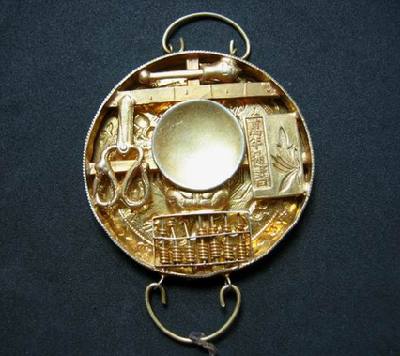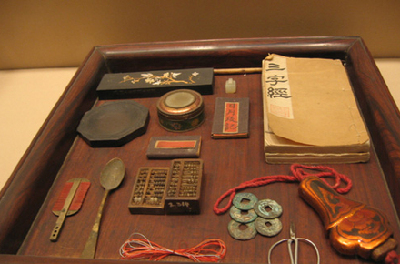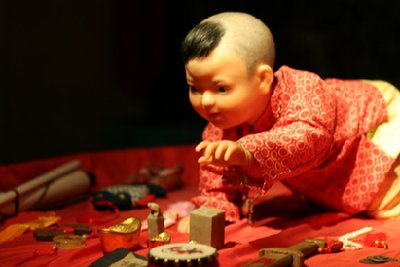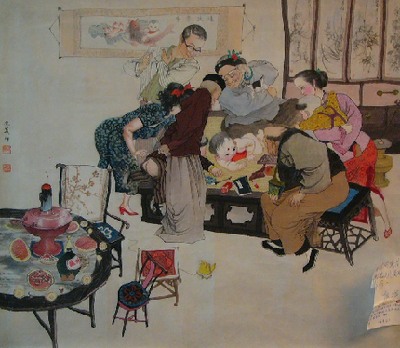The tradition of Zhuazhou
Zhuazhou is regarded as one of the most important customs on a child's first birthday anniversary. As a traditional, long-time custom in China, Zhuazhou is essentially a test where parents place an assortment of articles in front of their child to choose from to determine his or her future inclination and capabilities. The earliest written record of this custom can be traced back to the Song Dynasty (960-1279).
|
 |
In the late Qing Dynasty (1644-1911), this custom prevailed in Beijing. Zhuazhou is not an occasion for grand feasts and elaborate gifts: the hosts do not even send out invitations. The idea is that relatives will show up spontaneously to celebrate the child's first birthday. Gifts from relatives on this day are usually not costly, and do not include such items as golden or silver jewelry. Instead, dim sum or toys are presented to the child. Seniors meeting the child for the first time usually offer a coin to be fastened around the child's neck with thread. This custom is not only applicable to birthdays, but many other occasions, as well.
|
 |
The Zhuazhou ceremony usually takes place before the longevity noodle at lunchtime. A wealthy family will install a table on the bed (or "kang" -- a heated brick bed used in Northern China) where stamps, classic Confucian, Buddhist and Taoist books, a Chinese brush pen, ink, paper, an ink stone, abacus, coins, an accounting book, jewelry, flowers, rouge, food and toys are placed. If the baby is female, the following items are added: a scoop, spoon (representing cooking utensils), scissors, ruler (representing sewing items), thread and a design book (representing embroidery). The practice, however, is much more simplified in a common family. Usually a bronze tray instead of a table is placed on the "kang" and a book from old-style private schools, like the Three-Character Primer, is put on top, including a Chinese brush pen, abacus and a cake. Scissors, shears and a ruler are added for a girl. The parents then seat the baby in front of the table or the tray. Without help or guidance from anyone, the baby is then free to choose anything in front of them. The selected items he or she chooses are used to foretell the child's interests, career and inclination in the future.
|
 |
Selecting the stamp means the child will be an officer in the future; if he or she chooses the stationery first, the baby will be industrious and endowed with great literary talents; the abacus suggests a penchant for statistics and financing. A girl baby who first grabs a sewing item or cooking utensil will be a good housewife. On the other hand, when the child picks a cake or a toy, he or she will know how to enjoy the pleasures in life. All in all, parents and relatives pin high hope on the future of their children, and the custom of Zhuazhou is a method of expressing their good wishes.
|
 |
The custom of Zhuazhou reflects how the parents, grandparents and other relatives will encourage the child, and how they will conduct enlightenment education. Therefore, even though some parents may not be superstitious, they will still carry out the custom. This is also why the custom has been passed on through so many generations and is still practiced to this day.


















